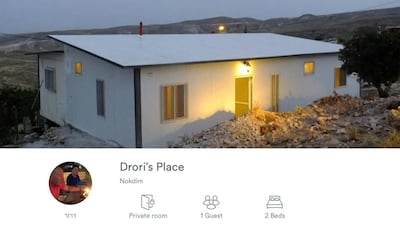JERUSALEM // Jewish settlers are advertising their properties on the accommodation booking website Airbnb despite living illegally on occupied Palestinian land.
The homes inside settlements and outposts in the West Bank and East Jerusalem claim in most cases to be located in Israel. None of the adverts mention that the homes, illegal under international law, are located in Palestinian territory and come with no warnings over safety and security.
The adverts sparked accusations from Palestinian leaders that Airbnb was “profiting” from Israel’s occupation. The US-based website makes money from each accommodation booking secured, taking a percentage of the nightly rate.
“It’s not only controversial, it’s illegal and criminal — this website is promoting stolen property and land,” said Husam Zomlot, ambassador at large for Palestine.
He called on Airbnb to apologise to Palestinians affected by the settlements. “There will come a time when companies like this, who profit from the occupation, will be taken to court,” he added.
One Airbnb listing showed a photograph of a detached cottage, with a lavender bush and hedge row. “An affordable place to stay. In a residential suburb of Jerusalem,” the listing said, with a price of 471 shekels (Dh440) a night.
“Efrat is a beautiful, residential and lush town, close to Jerusalem, surrounded by historical sites and nice walking paths in nature,” the host told The National. Her property is “part of the state of Israel”, she added, saying she had lived there for 30 years.
Efrat is in fact an illegal settlement established in 1983 on occupied Palestinian land. It is 12 kilometres south of Jerusalem near Bethlehem and nearly 7km east of the green line agreed in a 1949 armistice between Arab armies and Israel after the 1948 war.
When asked if she told guests her property was inside a settlement and that security should be considered, she replied: “people come to us knowing that Efrat is part of the state of Israel, and are not concerned with safety and security issues.”
Another advert shows a room for rent in Ma’ale Rehavam, a highly controversial settlement outpost south of Bethlehem, parts of which even Israel deems to be illegal. The listing is scant on detail, but states it is an apartment for the price of 105 shekels per night.
The advertisement describes the accommodation as a “nice place in the Judaean desert. about 15 minutes driving from Jerusalem.”
“I don’t want to get into politics, but statistically it is safer here than within the green line,” said the owner. He said the home was running on electricity from a generator and used water tanks.
Settlements, and their expansion have long been seen as a major roadblock to a Palestinian state. Under the Israeli government led by Benjamin Netanyahu, settlement expansion has surged. The Jewish settler population grew by 23 per cent between 2009 and 2015 to more than 400,000 people, including East Jerusalem, in comparison to an overall population growth rate of 9.6 per cent inside Israel.
In 2011, Jewish settler councils launched a campaign to try to get half a million visitors to settlements in five years.
“Anyone who stays in an Airbnb facilitates the commission of the crime of establishing settlements and therefore aids and abets the crime. Same applies to making money from property built on illegal settlements,” said John Dugard, a former Special Rapporteur to the UN on Palestine and professor of international law at Leiden Law School.
He said Airbnb should at least indicate clearly when the accommodation is inside a settlement, in the same way European Union regulations now require produce from settlements to be labelled as coming from settlement.
When hosts sign up to Airbnb to list their property as accommodation they are required to accurately locate the home, and can be investigated if they do not.
Some of the listers from settlements break this rule by stating their property is in Israel.
“This is obviously a common factual mistake which many commit, mainly in Israel, but apparently also abroad,” said Dror Etkes, an expert on Israel’s settlement policy.
He said settlers were spending a lot of money on promoting tourism. “The idea behind this campaign is to create jobs and to increase the flow of money into the settlements and to increase the number of Israelis and tourists who consider the settlements and the West Bank in general as a ‘normal’ and legitimate part of the state of Israel.”
Airbnb did not respond specifically to questions from The National, but spokesman Peter Huntingford said: "We follow laws and regulations on where we can do business and investigate concerns raised about specific listings."
The company, founded in 2008 in San Francisco, has soared in popularity with listings in 34,000 cities and 70 million people having booked with the company.
It describes itself as a “trusted community marketplace for people to list, discover, and book unique accommodations around the world”.
“It’s bizarre that Airbnb are not applying their ethical approach to illegal settlements,” said Palestinian Liberation Organisation spokesman on tourism Fadi Kattan.
Ambassador Zomlot said Palestinians are trying to reclaim tourism, “to ensure the benefits stay in Palestine.”
“It’s hard under the occupation as people visit our sites, but stay in Israel,” he said. “If Israel lifted its grip on tourism we would get up to 20 million visitors a year, instead of 1.5 million and they would spend their tourism dollars in Palestine, instead of Israel.”
foreign.desk@thenational.ae

